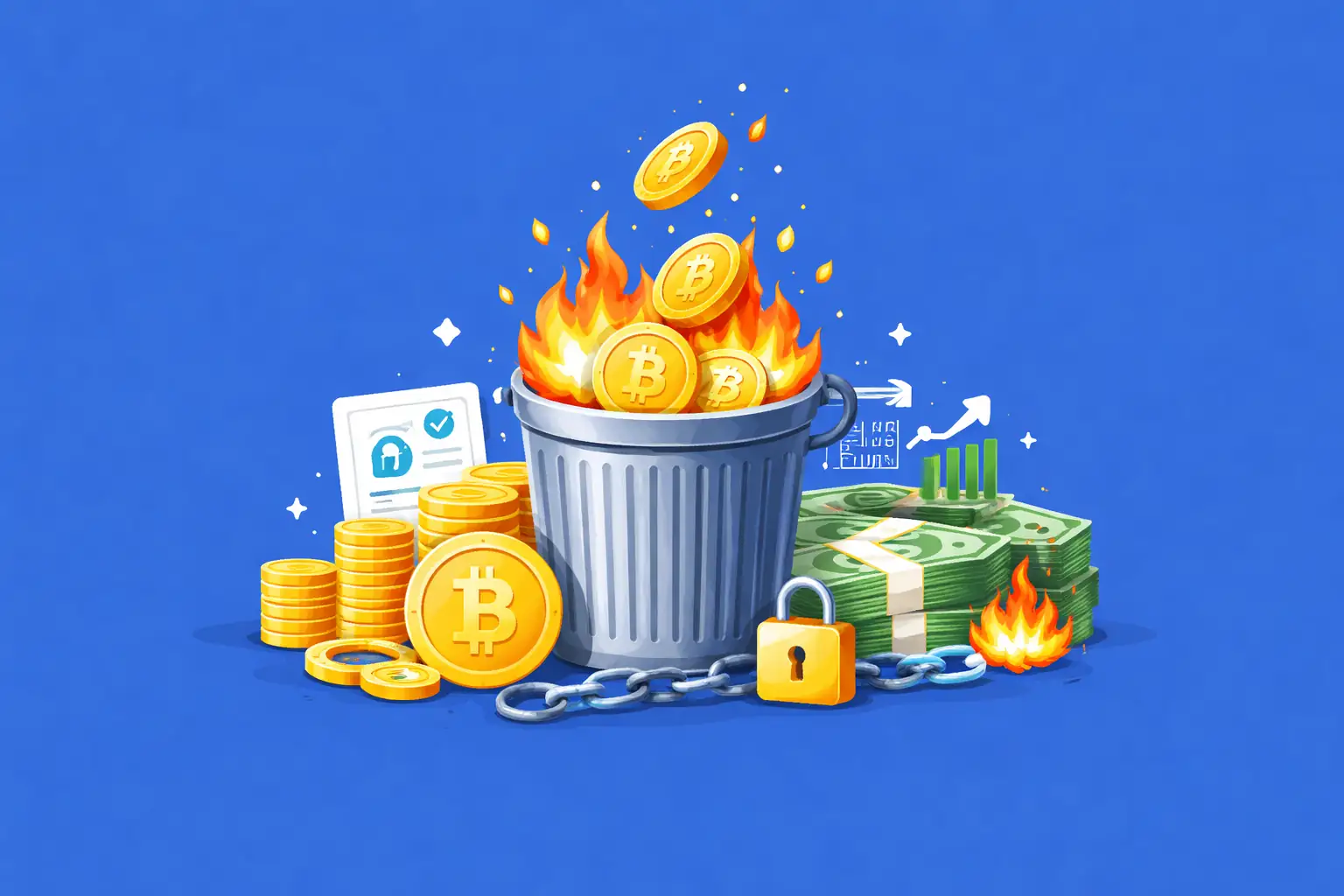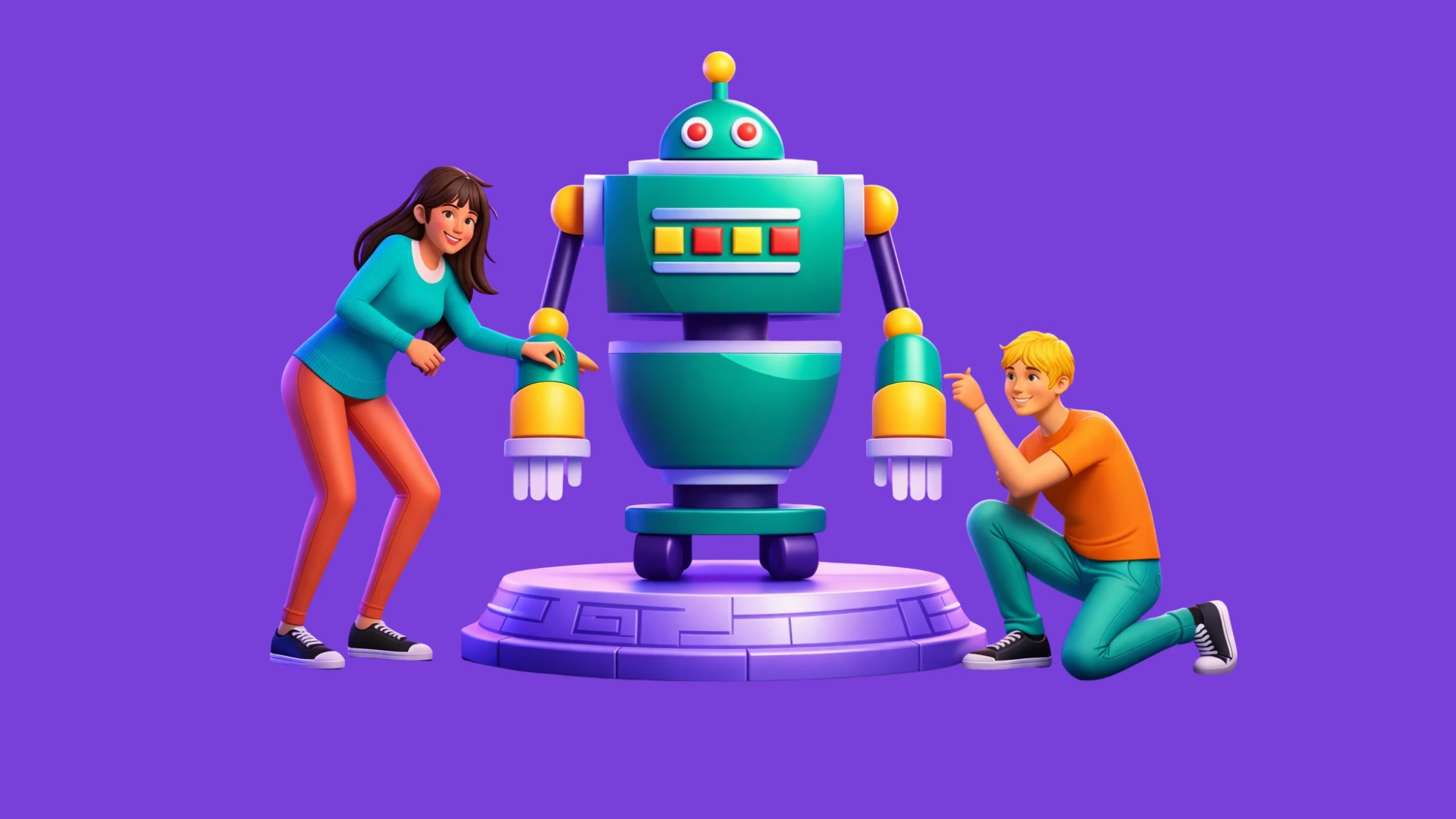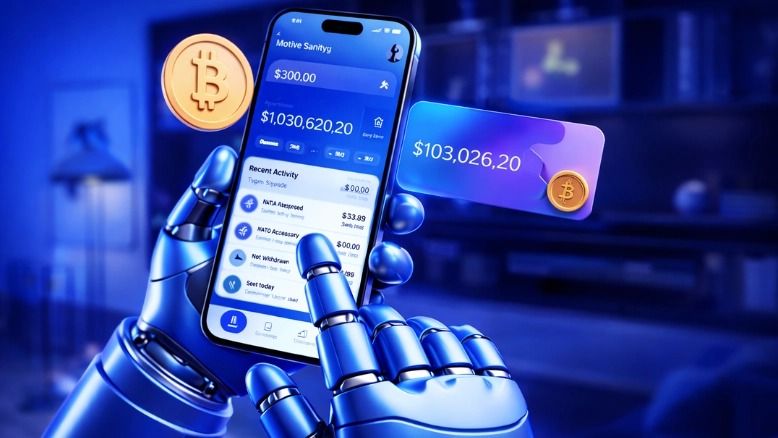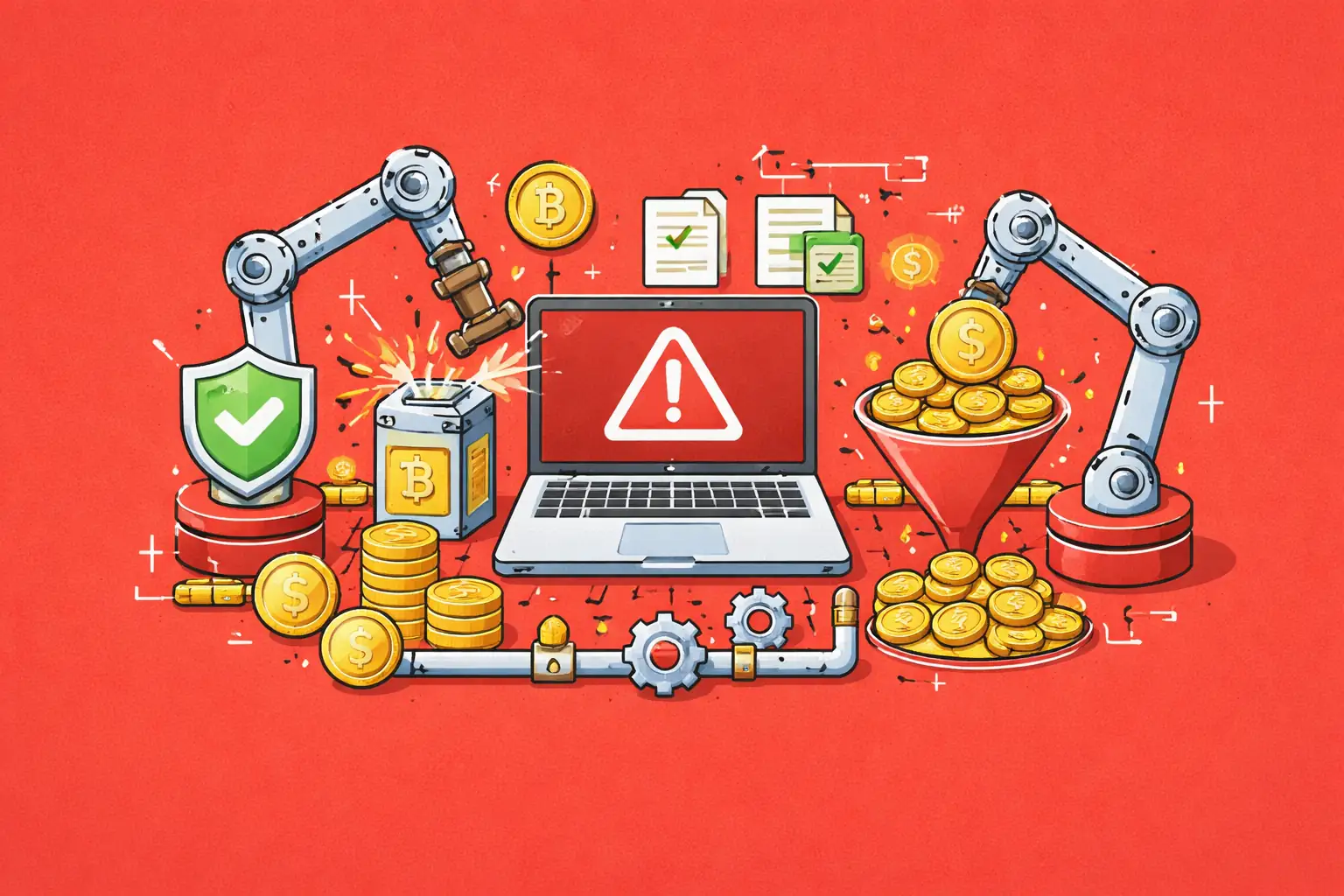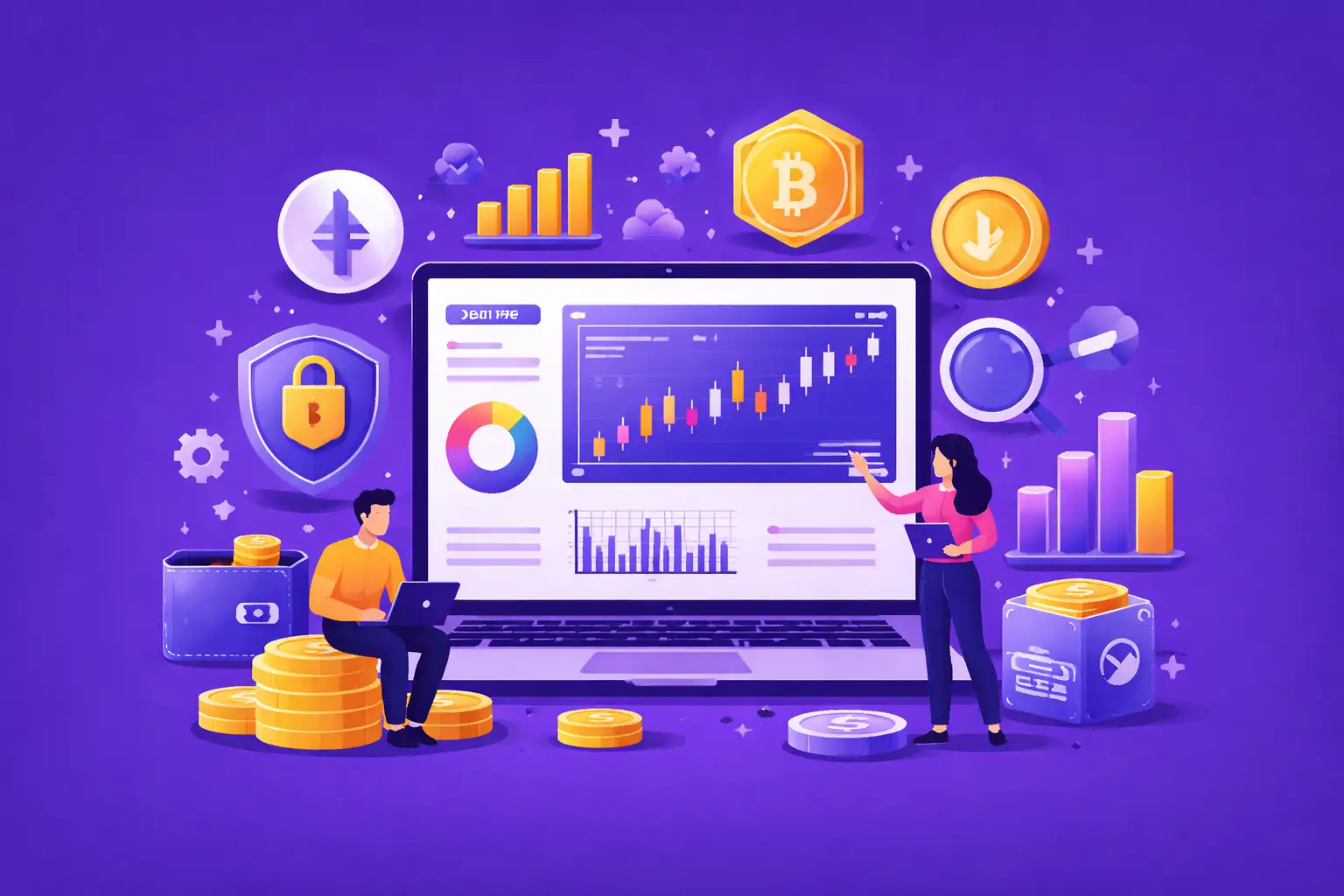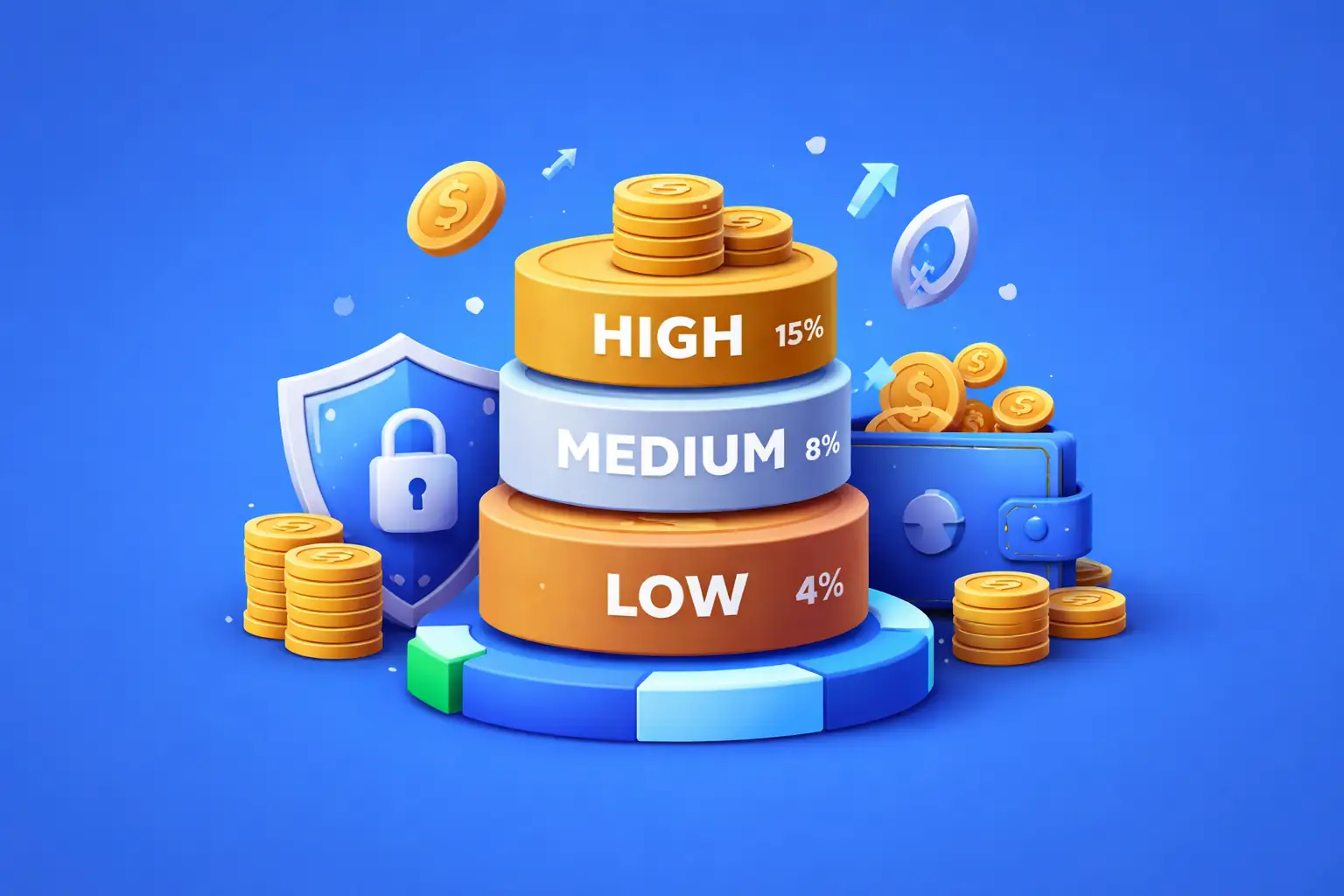Key Takeaways
- Proof of Burn is a consensus mechanism where participants permanently destroy cryptocurrency to earn the right to validate blocks and receive rewards.
- Coins are sent to a provably unspendable burn address with no private key, making the destruction irreversible and publicly verifiable.
- PoB was proposed by Iain Stewart in 2012 as an energy efficient alternative to Bitcoin’s Proof of Work system.
- Unlike Proof of Stake, where coins are locked and recoverable, Proof of Burn coins are permanently gone, representing the strongest form of economic commitment.
- Counterparty and Slimcoin are among the most notable projects that have implemented Proof of Burn in real world blockchain applications.
- Coin burning is widely used for tokenomics management, reducing supply, preventing spam, and creating deflationary pressure that can support token value.
- Proof of Burn is significantly more energy efficient than Proof of Work since it requires no specialized hardware or intensive computation.
- Key risks include permanent loss of assets, potential wealth concentration, and limited adoption compared to PoW and PoS systems.
- Ethereum’s EIP 1559 base fee burning mechanism demonstrates how burn concepts are being integrated into major blockchain ecosystems.
- The future of Proof of Burn lies in hybrid consensus models, DeFi integrations, cross chain bridges, and creative applications in gaming and NFT platforms.
Introduction to Proof of Burn in Bitcoin
Blockchain technology relies on consensus mechanisms to validate transactions, secure the network, and maintain trust among participants. While most people are familiar with Proof of Work (used by Bitcoin) and Proof of Stake (used by Ethereum), there is another fascinating and lesser known consensus model called Proof of Burn.
At first glance, the idea of intentionally destroying cryptocurrency sounds completely counterintuitive. Why would anyone permanently destroy something valuable? But in the world of blockchain, Proof of Burn in Bitcoin and other cryptocurrencies serves a powerful purpose. It demonstrates commitment, reduces circulating supply, and can even bootstrap entirely new blockchain networks.
Think of it like a loyalty program where instead of spending money to earn points, you permanently shred a certain amount of cash to prove your dedication. The act of destruction itself becomes your proof of commitment. The more you burn, the more the network trusts and rewards you.
In this comprehensive guide by Nadcab Labs, we will explore everything about Proof of Burn in Bitcoin, including how it works, why it exists, how it compares to other consensus mechanisms, its real world applications, and what the future holds for this innovative concept.
Quick Fact: Proof of Burn was first proposed by Iain Stewart in 2012 as an energy efficient alternative to Proof of Work, offering a way to achieve consensus without massive electricity consumption.
What Is Proof of Burn in Bitcoin?
Proof of Burn (PoB) is a consensus mechanism where participants intentionally send their cryptocurrency to a special address from which it can never be recovered or spent again. This address is called an eater address or burn address. The coins sent to this address are permanently removed from circulation, effectively “burned” or destroyed.
By burning coins, participants prove they have made a genuine financial sacrifice. In return, the protocol grants them the right to validate transactions and mine new blocks, similar to how miners in Proof of Work spend electricity or how validators in Proof of Stake lock up their coins.
Imagine you want to join an exclusive club. Instead of paying a membership fee that goes to the club owner, you take an equivalent amount of money, walk to the town square, and publicly set it on fire. Everyone can see that you made the sacrifice. Nobody benefits from your burned money, but the act itself proves your genuine commitment. That is the essence of Proof of Burn.
Key Terminology
Burn Address
A special wallet address with no known private key. Coins sent here are permanently unrecoverable and removed from total supply.
Coin Burning
The deliberate act of sending cryptocurrency to a burn address. This can be done for consensus purposes, tokenomics management, or supply reduction.
How Does Proof of Burn Work?
The mechanics of Proof of Burn are elegant in their simplicity. The process begins when a user decides to participate in the consensus mechanism by sending a certain amount of cryptocurrency to a verifiable burn address. This transaction is recorded on the blockchain, making it publicly auditable and irreversible.
Once the coins are burned, the protocol recognizes the sacrifice and assigns the user a “virtual mining power” proportional to the amount they destroyed. The more coins a participant burns, the higher their chances of being selected to validate the next block and earn block rewards.
Think of it like a raffle at a charity event. Instead of buying raffle tickets with cash that goes to the organizers, you buy tickets by publicly tearing up dollar bills. Each bill you tear gives you one raffle ticket. The more bills you destroy, the better your odds of winning the prize. Nobody profits from the destroyed money, but the system remains fair because everyone makes the same kind of sacrifice.
How the Proof of Burn Process Flows
1
Select Coins: The participant chooses the amount of cryptocurrency they wish to burn
2
Send to Burn Address: Coins are transferred to a verified eater address with no private key
3
Blockchain Records: The burn transaction is permanently recorded on the public ledger
4
Mining Power Assigned: The protocol grants virtual mining rights proportional to the burned amount
5
Block Validation: The participant can now validate transactions and earn rewards over time
6
Decay Over Time: In most implementations, burning power decays, encouraging continuous participation
It is worth noting that in many Proof of Burn implementations, the mining power gained from burning coins gradually decreases over time. This prevents early adopters from dominating the network forever and encourages ongoing participation, much like how a gym membership expires and needs to be renewed.
History and Origin of Proof of Burn
The concept of Proof of Burn was introduced by Iain Stewart in 2012 on the Bitcointalk forum, one of the earliest and most influential platforms for cryptocurrency discussions. Stewart proposed PoB as a thought experiment and potential alternative to the energy intensive Proof of Work system that Bitcoin uses.
At the time, concerns about Bitcoin’s electricity consumption were already growing. Stewart’s idea was revolutionary: what if, instead of burning electricity to prove your commitment to the network, you could burn coins instead? The financial sacrifice would serve the same purpose as computational work, proving that a participant had “skin in the game” without requiring massive amounts of energy.
The proposal drew significant attention in the crypto community. While Bitcoin itself never adopted Proof of Burn as its primary consensus mechanism, the idea inspired several newer projects to implement it in creative ways. Slimcoin, launched in 2014, became one of the first cryptocurrencies to fully implement PoB as part of its hybrid consensus system.
Over the years, the concept of burning has evolved beyond just consensus. Today, coin burning is used for tokenomics management, deflationary supply strategies, spam prevention, and even cross chain bootstrapping. The idea that destroying value can create value has become a foundational principle in modern blockchain design.
Proof of Burn vs Proof of Work vs Proof of Stake: Key Differences
Understanding how Proof of Burn in Bitcoin compares to other consensus mechanisms is essential for grasping its unique position in the blockchain landscape. Each mechanism solves the same fundamental problem (achieving distributed consensus) but takes a very different approach.
The key distinction is that Proof of Work burns energy externally, Proof of Stake locks value temporarily, and Proof of Burn destroys value permanently. Each approach has trade offs, but PoB stands out for its simplicity and its direct impact on reducing token supply.
Why Do People Burn Bitcoin and Cryptocurrency?
Coin burning is not limited to consensus participation. There are several strategic and practical reasons why individuals and projects choose to burn cryptocurrency tokens.
Reducing Circulating Supply
By removing coins from circulation, burning can create scarcity. When supply decreases while demand stays the same or increases, the value of remaining tokens tends to rise. Many projects use scheduled burns as a deflationary tool.
Bootstrapping New Blockchains
Some new blockchains require users to burn Bitcoin or another established cryptocurrency to receive tokens on the new network. This creates a fair distribution method that requires genuine investment.
Preventing Spam Transactions
Requiring a small amount of tokens to be burned per transaction makes spam attacks expensive. If flooding the network costs real money that is permanently lost, bad actors are financially discouraged from attacking.
Demonstrating Long Term Commitment
When project teams burn a portion of their own token allocation, it signals to the community that they are committed for the long term and are not planning to dump tokens for quick profit.
A practical real world example: imagine an online tipping platform where users tip content creators. If the platform burns a tiny fraction of every tip (like 1%), the total supply of the tipping token decreases over time. The more people use the platform, the scarcer the token becomes, which can increase its value for everyone holding it. It is like a coffee shop loyalty card where each purchase slightly reduces the total number of reward points in existence.
Step by Step: How Coin Burning Actually Works on the Blockchain
Let us walk through the exact technical process of how coin burning works on a blockchain. While the concept is simple, the underlying mechanics are precise and verifiable.
Step 1: The Burn Address Is Created. A burn address is a wallet address that is provably unspendable. It has no corresponding private key, which means nobody can ever access or move the coins sent to it. A common example on Bitcoin is an address starting with “1111111111111111111114oLvT2” which is mathematically impossible to unlock.
Step 2: The User Initiates a Burn Transaction. The participant creates a standard blockchain transaction, entering the burn address as the recipient. They specify the amount of cryptocurrency they want to destroy and confirm the transaction.
Step 3: The Transaction Is Broadcast to the Network. Like any other transaction, the burn is broadcast to the entire blockchain network. Miners or validators include it in the next block.
Step 4: The Burn Is Permanently Recorded. Once confirmed, the transaction is immutably recorded on the blockchain. Anyone can verify that the coins were sent to the burn address and are permanently out of circulation.
Step 5: Mining Rights Are Granted (for PoB Consensus). If the burning is part of a Proof of Burn consensus mechanism, the protocol calculates the participant’s virtual mining power based on the amount burned and begins assigning block validation opportunities.
Simple Analogy: Burning coins is like cutting up a prepaid gift card and posting a photo as proof. Everyone can see the card is destroyed. The value is gone, but the act of destroying it proves your sincerity and earns you something in return from the system.
Real World Examples of Proof of Burn in Action
Proof of Burn is not just a theoretical concept. Several real blockchain projects have implemented coin burning in meaningful ways. Understanding these examples helps illustrate how versatile and practical the mechanism can be.
Counterparty (XCP)
Counterparty is one of the most famous examples of Proof of Burn. During its launch in 2014, participants had to burn Bitcoin to receive XCP tokens. Over 2,100 BTC (worth approximately $1.8 million at the time) were permanently burned. Nobody, including the project founders, received the burned Bitcoin. This ensured a fair and trustless distribution of tokens.
Slimcoin (SLM)
Slimcoin is the first cryptocurrency to use Proof of Burn as a core part of its hybrid consensus mechanism alongside Proof of Work and Proof of Stake. By burning SLM coins, users earn the right to mine blocks without energy intensive hardware. It serves as one of the cleanest implementations of the original PoB concept.
Binance Coin (BNB) Quarterly Burns
While not a consensus mechanism, Binance conducts regular quarterly burns of BNB tokens. Binance uses a portion of its profits to buy back and permanently destroy BNB, reducing total supply. This strategy has contributed to BNB’s value appreciation by making each remaining token slightly more scarce over time.
Ethereum EIP 1559 Base Fee Burning
Since the London hard fork in August 2021, Ethereum burns a portion of the transaction fees (the base fee) with every block. This mechanism makes ETH potentially deflationary during periods of high network activity. Billions of dollars worth of ETH have been burned since implementation.
Advantages of Proof of Burn
The Proof of Burn mechanism offers several compelling advantages that make it attractive for certain blockchain applications.
Energy Efficiency
Unlike Proof of Work, PoB does not require massive amounts of electricity or specialized hardware. The only “cost” is the burned coins, making it significantly more environmentally friendly.
Fair Distribution
When used for token launches, PoB ensures nobody receives a free handout. Every participant must make a real financial sacrifice, creating a more equitable starting point.
Deflationary Pressure
Burning permanently reduces supply, creating natural scarcity. This built in deflationary mechanism can support long term value appreciation for token holders.
Cross Chain Bootstrapping
PoB allows new blockchains to leverage the value of existing networks. Burning Bitcoin to receive new tokens bridges value from an established chain to a new one.
Simplicity of Implementation
The mechanism is conceptually straightforward and does not require complex hardware setups. Anyone with coins can participate, making it more accessible than mining.
Provable Commitment
Unlike staking where coins can be withdrawn, burned coins are gone forever. This represents the strongest possible form of financial commitment to a network.
Disadvantages and Risks of Proof of Burn
While Proof of Burn has clear advantages, it also comes with significant drawbacks and risks that must be carefully considered.
1
Permanent and Irreversible Loss
Once coins are burned, they are gone forever. If the new project fails or the participant changes their mind, there is no way to recover the destroyed assets. This is a much higher risk than staking, where coins can be withdrawn.
2
Wealth Concentration Risk
Wealthier participants can afford to burn more coins, gaining disproportionately more mining power. This could lead to centralization where only the richest entities dominate block validation.
3
Wasted Economic Value
Critics argue that burning cryptocurrency is fundamentally wasteful. The destroyed value does not contribute to any productive economic activity, unlike energy used in PoW which at least powers the network’s security computations.
4
Limited Real World Adoption
Very few major blockchains use PoB as their primary consensus mechanism. The concept remains largely experimental, which means less community support, fewer development tools, and limited battle testing.
5
Verification Complexity
Verifying that coins were genuinely sent to a provably unspendable address can be complex. Mistakes in burn address generation or validation could create security loopholes.
Proof of Burn and Token Economics (Tokenomics)
One of the most impactful applications of Proof of Burn extends beyond consensus into the realm of tokenomics, the economic design of a cryptocurrency. Burning plays a critical role in managing supply, influencing demand, and shaping the long term economic health of a project.
Consider basic supply and demand economics. If you have 1,000 tokens in circulation and the demand remains constant, each token holds a certain value. Now, if you burn 200 tokens, only 800 remain. With the same demand chasing fewer tokens, each remaining token becomes more valuable. This is the fundamental principle behind deflationary tokenomics.
Think of it like a limited edition trading card collection. If the company announces they are permanently destroying 20% of all printed cards, the remaining cards instantly become rarer and more desirable. The act of destruction creates value for everyone who still holds a card.
Common Tokenomic Burning Strategies
- Scheduled Burns: Pre planned periodic burns where a fixed percentage of tokens are destroyed at regular intervals
- Transaction Fee Burns: A portion of every transaction fee is permanently removed from supply (like Ethereum’s EIP 1559)
- Buyback and Burn: The project uses revenue to buy tokens from the open market and then destroys them
- Milestone Burns: Tokens are burned when specific project milestones are achieved, rewarding the community
How Proof of Burn Affects Bitcoin Supply
Bitcoin has a hard cap of 21 million coins. This fixed supply is one of its most celebrated features. However, what many people do not realize is that a meaningful number of Bitcoin have already been lost or burned, further reducing the effective circulating supply.
When Bitcoin is sent to a burn address, those coins are removed from the usable supply permanently. This means the actual number of Bitcoin that can ever be transacted is already less than 21 million. Analysts estimate that between 3 to 4 million Bitcoin are permanently lost due to forgotten private keys, hardware failures, and intentional burns.
The most notable intentional burn in Bitcoin’s history was during the Counterparty launch, where over 2,100 BTC were sent to a burn address. At today’s prices, that represents a staggering amount of permanently destroyed value. But the purpose was clear: to create a trustless, fair token distribution without any party receiving undue advantage.
Did You Know? According to research from Chainalysis, approximately 20% of all existing Bitcoin may be permanently inaccessible due to lost keys and intentional burns. This makes the remaining supply even more scarce than the 21 million cap suggests.
Proof of Burn in Altcoins and New Blockchain Projects
While Bitcoin does not use Proof of Burn as its native consensus mechanism, many altcoins and newer blockchain projects have adopted burning as a core feature. Here is a look at how different projects implement coin burning:
As blockchain technology continues to mature, burning mechanisms are becoming increasingly sophisticated. At Nadcab Labs, we closely track these developments and help projects design tokenomic models that incorporate burning strategies effectively.
Security Aspects of Proof of Burn
Security is a primary concern for any consensus mechanism. Proof of Burn addresses several key security challenges, though it also introduces some unique considerations.
The fundamental security model of PoB is rooted in economic cost. Attacking a PoB network requires an attacker to permanently destroy significant amounts of cryptocurrency. Unlike Proof of Stake, where an attacker could potentially recover their staked funds after an attack, burned coins are lost forever. This makes the cost of attack genuinely irreversible, which is a strong deterrent.
Think of it this way: if a thief knows that attempting to rob a vault requires them to permanently burn their own house regardless of whether the robbery succeeds, most would think twice. The irreversible nature of the sacrifice is what makes PoB inherently resistant to certain types of attacks.
Security Strengths of Proof of Burn
- Costly to Attack: Any malicious actor must destroy real value, making large scale attacks financially devastating
- No Hardware Arms Race: Without mining hardware, the risk of 51% attacks through accumulated computing power is eliminated
- Transparent and Auditable: All burn transactions are visible on the public blockchain, allowing anyone to verify participants’ commitments
- Decentralized by Design: The decay mechanism prevents long term power concentration by requiring continuous new burns
Is Proof of Burn Environmentally Friendly?
One of the primary motivations behind the creation of Proof of Burn was addressing the massive energy consumption of Proof of Work. Bitcoin mining alone consumes more electricity than many small countries, raising legitimate environmental concerns.
Proof of Burn offers a dramatically greener alternative. Since PoB does not require energy intensive computations or specialized mining hardware, its carbon footprint is minimal. The only energy consumed is the basic electricity needed to run a standard computer and process transactions, which is comparable to Proof of Stake systems.
However, the “environmental friendliness” of PoB comes with a philosophical caveat. While it does not consume physical energy, it does consume economic energy by permanently destroying valuable tokens. Some argue that destroying financial value is its own form of waste, even if it does not directly harm the planet. Others counter that this trade off is far preferable to the tangible environmental damage caused by massive mining operations.
Environmental Positives
- No mining hardware needed
- Minimal electricity consumption
- No e waste from outdated ASICs
- Comparable to PoS in energy use
Points to Consider
- Economic value is destroyed
- Burned coins had their own energy cost to create
- Long term sustainability is debated
- Indirect environmental impact is hard to measure
Common Misconceptions About Proof of Burn
As with any complex blockchain concept, there are several widespread misunderstandings about Proof of Burn. Let us address the most common ones.
“Burning Means Physically Destroying Coins”
No physical destruction takes place. Burning is a digital process where coins are sent to an unspendable address on the blockchain. The term “burn” is metaphorical, referring to making coins permanently inaccessible, not literally setting something on fire.
“Someone Secretly Owns the Burn Address”
Burn addresses are mathematically provable unspendable. They are generated in a way that makes it cryptographically impossible for anyone to possess the private key. This can be verified by anyone examining the address structure.
“Burning Always Increases Token Price”
While reducing supply can create upward price pressure, burning alone does not guarantee a price increase. If demand drops faster than supply decreases, the price can still fall. Burning is one factor among many that influence token value.
“Proof of Burn and Proof of Stake Are the Same”
These are fundamentally different. In PoS, your coins are locked but can be retrieved later. In PoB, coins are permanently destroyed. The commitment level, risk profile, and economic impact are entirely different.
Future of Proof of Burn in Blockchain Technology
The future of Proof of Burn in Bitcoin and the broader blockchain ecosystem looks promising, even though it may never become the dominant consensus mechanism. Several emerging trends suggest that burning will play an increasingly important role in how blockchains are designed and managed.
Hybrid Consensus Models: More projects are exploring combinations of PoW, PoS, and PoB to create multi layered security systems. Slimcoin pioneered this approach, and future blockchains may refine it further, using PoB as one layer of a comprehensive consensus stack.
DeFi and Burning Mechanisms: Decentralized finance protocols are increasingly integrating burn mechanics. Fee burning, governance token burning, and liquidation burns are becoming standard features in DeFi tokenomics, creating deflationary pressure that benefits long term holders.
Cross Chain Value Transfer: As the multi chain future becomes reality, Proof of Burn may serve as a trustless bridge mechanism. Burning tokens on one chain to mint equivalent tokens on another could become a fundamental building block for blockchain interoperability.
NFT and Gaming Applications: Some gaming and NFT platforms are experimenting with burn mechanics where players destroy tokens to unlock rare items or access special features. This creates engaging economies where destruction drives value creation.
As noted by researchers referenced on Wikipedia’s Proof of Burn page, the mechanism continues to generate academic interest and real world experimentation, suggesting it will remain a relevant tool in the blockchain developer’s toolkit for years to come.
Final Thoughts on Proof of Burn in Bitcoin
Proof of Burn in Bitcoin represents one of the most creative and thought provoking innovations in blockchain consensus design. The idea that permanently destroying value can create trust, security, and economic benefit challenges conventional thinking but has proven its worth in multiple real world applications.
From Counterparty’s pioneering Bitcoin burn to Ethereum’s ongoing fee burning mechanism, and from Slimcoin’s hybrid consensus to Binance’s quarterly BNB burns, the concept of coin burning has evolved from a theoretical proposal into a widely used strategy that shapes how modern blockchains operate.
Whether you are an investor trying to understand why a project burns tokens, a developer exploring consensus alternatives, or simply a curious learner discovering the breadth of blockchain technology, understanding Proof of Burn gives you a deeper appreciation of how decentralized systems achieve trust and manage economic incentives.
At Nadcab Labs, we are committed to helping our community and clients stay ahead of the curve in blockchain innovation. The world of consensus mechanisms is constantly evolving, and Proof of Burn will undoubtedly continue to play a meaningful role in shaping the future of decentralized technology.
Stay curious, stay informed, and always approach blockchain decisions with a clear understanding of the underlying technology.
Frequently Asked Questions
Bitcoin itself uses Proof of Work as its consensus mechanism. However, Bitcoin has been used in Proof of Burn processes by other projects, most notably Counterparty, where participants burned BTC to receive XCP tokens.
No. Once coins are sent to a burn address, they are permanently and irreversibly removed from circulation. The burn address has no private key, making it mathematically impossible for anyone to access or spend those coins ever again.
Not necessarily. While reducing supply can create upward price pressure, the actual price depends on many factors including overall demand, market conditions, project fundamentals, and investor sentiment. Burning alone does not guarantee price appreciation.
Neither is inherently “better” as they serve different purposes. PoB demonstrates stronger commitment since coins are permanently destroyed, while PoS is more flexible since coins can be unstaked. The right choice depends on the specific goals and design of the blockchain project.
The exact amount is difficult to quantify, but the most well known intentional burn involved over 2,100 BTC during the Counterparty launch. Additionally, analysts estimate that millions of Bitcoin are effectively “burned” through lost private keys, though these are accidental losses rather than deliberate burns.
Reviewed & Edited By

Aman Vaths
Founder of Nadcab Labs
Aman Vaths is the Founder & CTO of Nadcab Labs, a global digital engineering company delivering enterprise-grade solutions across AI, Web3, Blockchain, Big Data, Cloud, Cybersecurity, and Modern Application Development. With deep technical leadership and product innovation experience, Aman has positioned Nadcab Labs as one of the most advanced engineering companies driving the next era of intelligent, secure, and scalable software systems. Under his leadership, Nadcab Labs has built 2,000+ global projects across sectors including fintech, banking, healthcare, real estate, logistics, gaming, manufacturing, and next-generation DePIN networks. Aman’s strength lies in architecting high-performance systems, end-to-end platform engineering, and designing enterprise solutions that operate at global scale.
